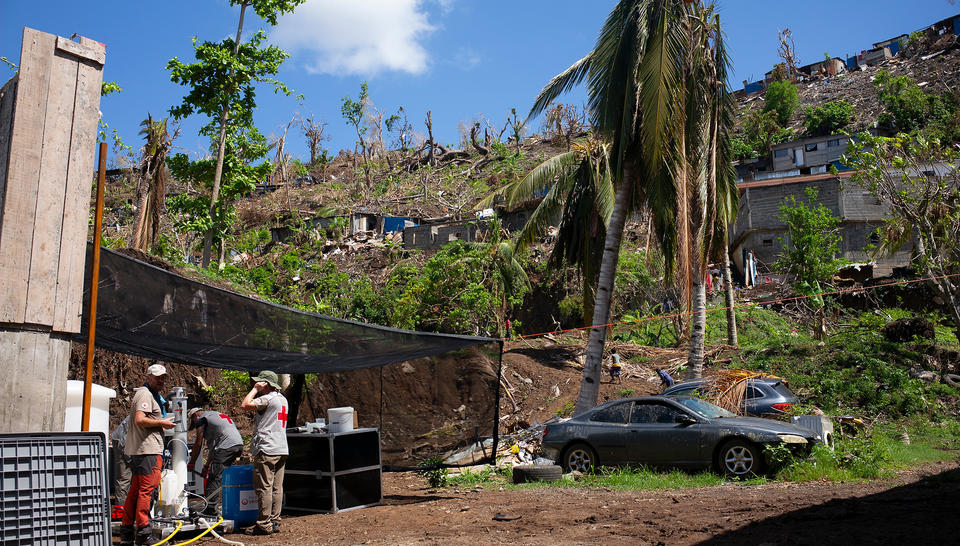After 25 years in the French Army, Charles Bourdin joined Veolia's Reunion subsidiary. At runéo, he manages the central warehouse and spent nearly a fortnight in Mayotte on a Veoliaforce mission for the Veolia Foundation. Here's the story.
You were mobilized in a matter of days, shortly after Cyclone Chido hit Mayotte, to be placed at the disposal of the French Red Cross by the Veolia Foundation. How did you manage to leave in 48 hours?
Charles Bourdin: The most complicated thing was to be able to equip ourselves before departure. The Sécurité Civile team sent to Mayotte had stocked up on supplies from La Réunion. The shelves of mosquito nets and freeze-dried meals, in particular, were empty! Personally, I was very lucky in that everyone trusted me to leave: the Veolia Foundation, my superiors, who accepted my absence without the slightest hesitation, and my family, who held back their concerns.
Was this mission your first contact with the humanitarian world?
CB : I knew humanitarian work from a distance, from my first life in the military, where certain missions touched on this world. But I'd never been plunged into the heart of the subject. I was blown away by the way the operation was organized, the way needs were prioritized and the constant commitment of everyone on the ground.
Had you already been to Mayotte during your time in the Army?
CB: Yes, I spent five months there in 1999, as part of a Foreign Legion detachment. I was stunned by the extent of the post-Chido damage. Visually, it's very shocking. And yet, we're used to cyclones on Reunion Island, but perhaps the infrastructure here is more resilient than in Mayotte.
Being a Veoliaforce volunteer means taking a certain expertise, both technical and behavioral, beyond our borders.
You hadn't yet had the opportunity to work with Aquaforces, the mobile water purification stations designed by the Veolia Foundation for humanitarian aid...
CB : Indeed. And I was blown away! The Aquaforces are extraordinary: you start with water where you wouldn't let an animal linger, and end up with water that everyone can drink. It's both highly technical and so easy to deploy. Having this kind of equipment is a constant source of motivation. You can feel it: the energy is there, irrigating the whole team, and the investment in the mission is total. You even lose track of time. The almost two-week mission went by in a flash.
Was this your first experience as a Veoliaforce volunteer?
CB: As soon as I heard about the Veoliaforce skills sponsorship program last year, I applied to the Veolia Foundation. For me, being a volunteer means taking a certain expertise, both technical and behavioral, beyond our borders. On a more personal level, it's also a way of getting out of my comfort zone. And after my first mission, I can tell you that meeting the other volunteers and the staff of the French Red Cross is extraordinary. It's a very powerful human experience. I'll never forget it.

Charles Bourdin spent 25 years in the French Army before joining Veolia. He is in charge of Runéo's central warehouse.
Aquaforces pre-positioned
The Veolia Foundation is stepping up the internationalization of its actions. It has launched the development of international hubs to facilitate the projection of resources made available to humanitarian partners. This strategy was illustrated in the aftermath of cyclone Chido in Mayotte. Several Aquaforces, the mobile water purification units designed by the Veolia Foundation for use in humanitarian contexts, were transported in early December and stored on the premises of the PIROI (Plateforme d'Intervention Régionale de l'Océan Indien) of the French Red Cross. They were quickly transported to Mayotte.





